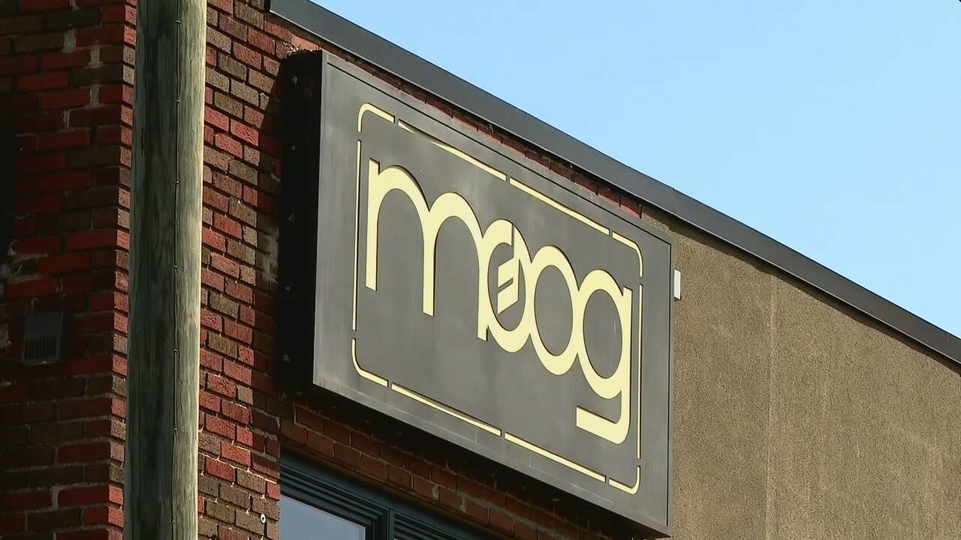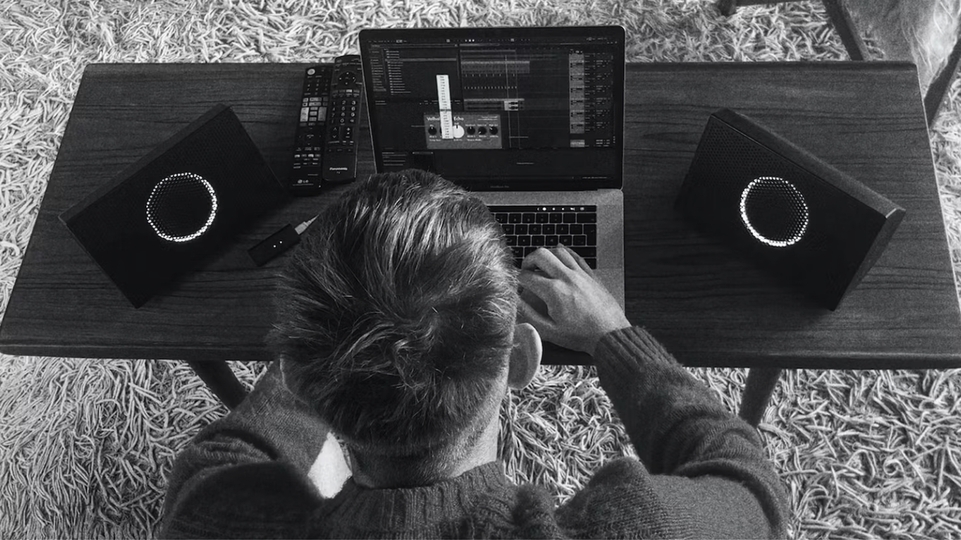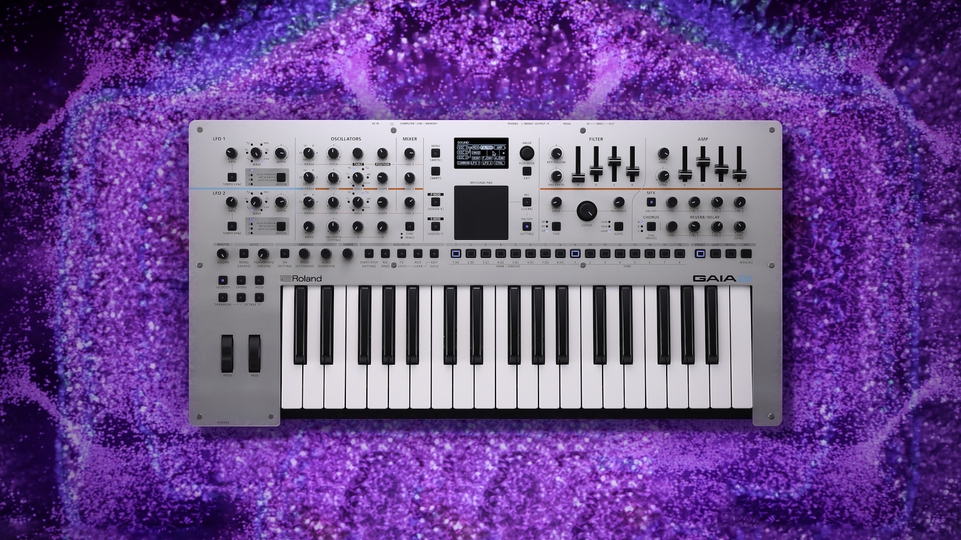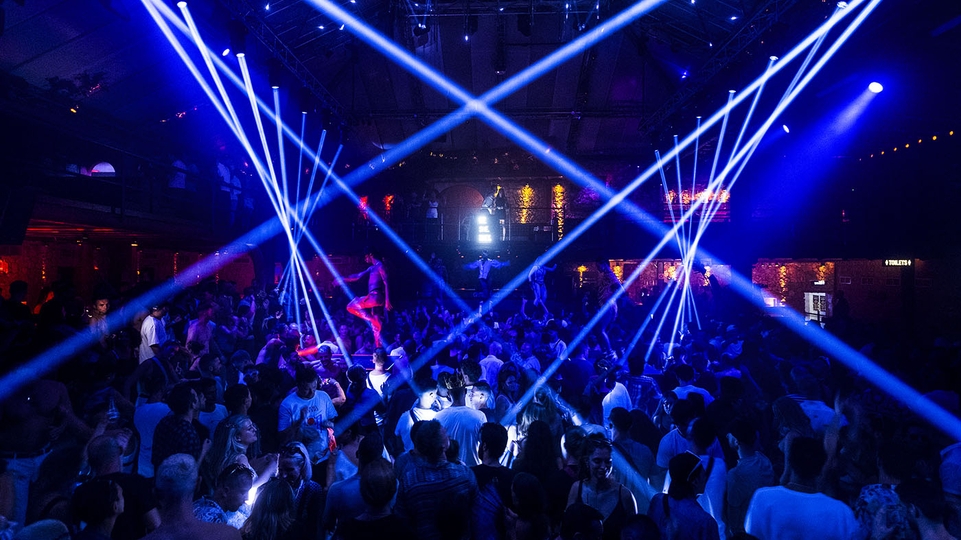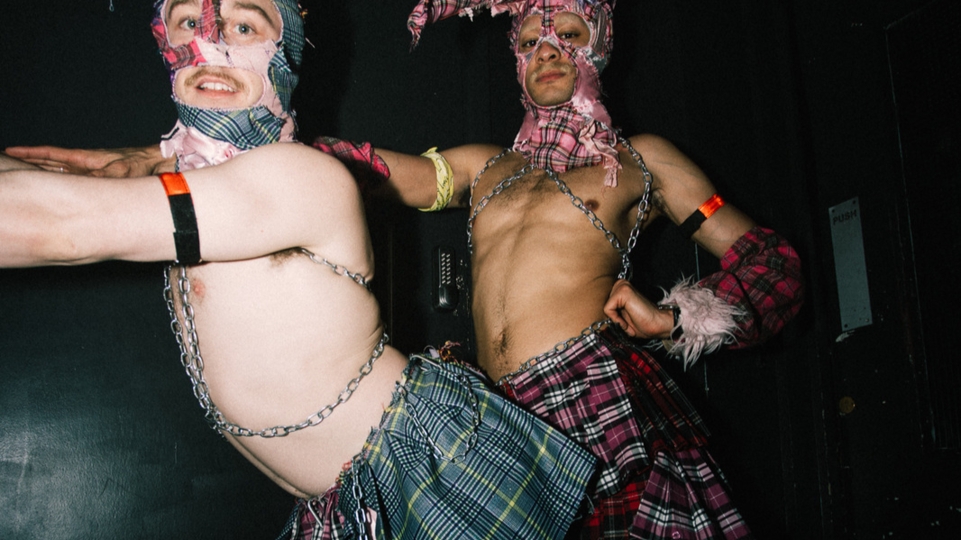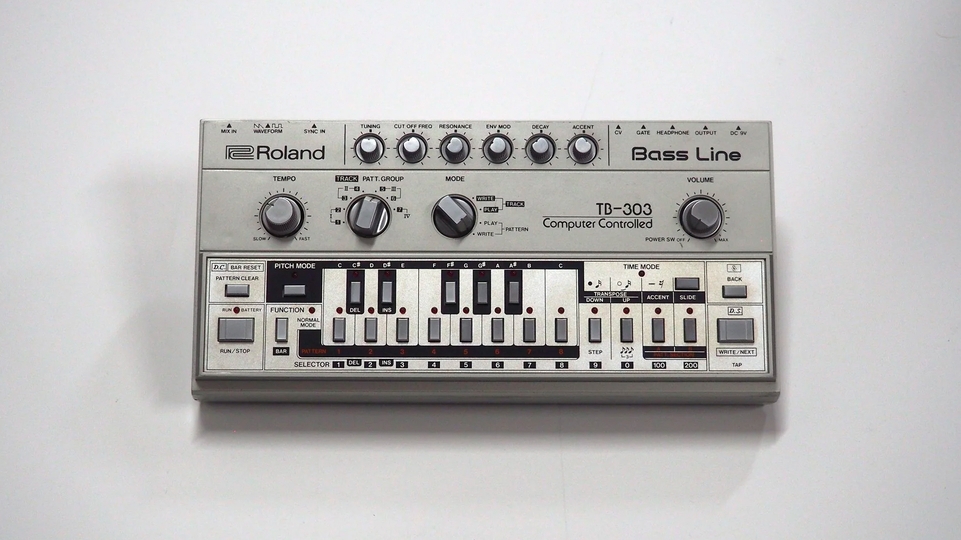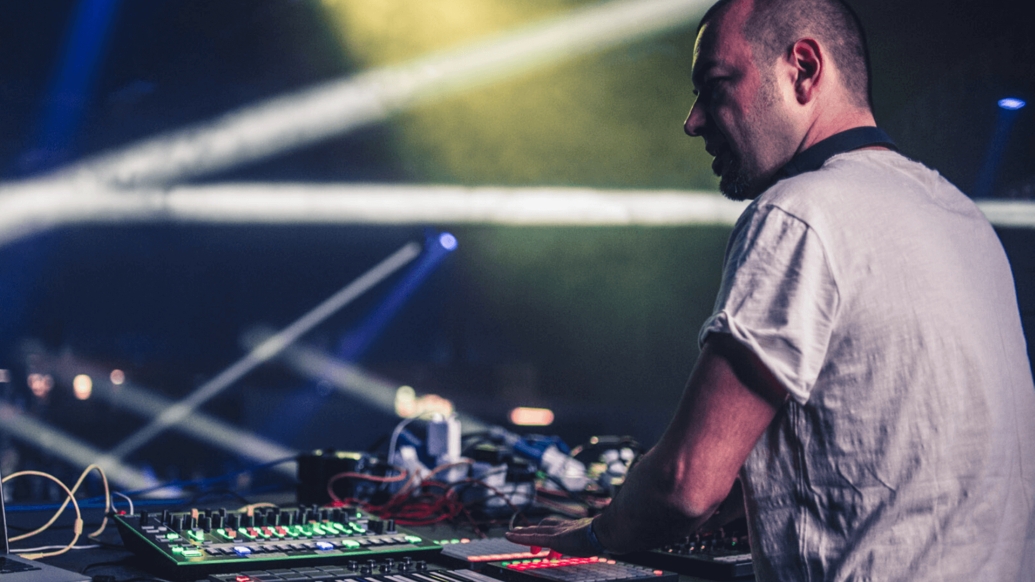
KiNK: How I Play Live
The Bulgarian crowd favourite takes us through an in-depth behind the scenes of his live show, set-up and performance approach
For over ten years, KiNK has been one of dance music’s most captivating live performers. His energy on stage is matched by the driving techno and house that emanates from the speakers when he plays, both as KiNK, and under the Cyrillic project he launched in 2015.
But it’s the controlled chaos of his live approach that delights the dancefloor, his improvisation driven by a collection of consistent kit, the hub of which has remained the same since he started his live show a decade ago. We spoke to the Bulgarian DJ, producer and performer about the equipment behind his set-up, his relationship with the crowd and how playing live has changed the way he makes music. KiNK will be performing a live show at Terminal V alongside Helena Hauff, Lena Willikens and Moxie on Saturday 11th April and has his own Soundcheck event in London on 9th May.
What made you want to develop a live show?
“In 2008, I had a few underground hits, the most notable ones were my collaborations with the British DJ and producer Neville Watson. At that time I signed with my first booking agent, Kai Fischer. I already had a long experience and a good reputation as a DJ in Bulgaria. I gained the self-esteem to try touring internationally. It was very difficult to make it work. I think it's because my diverse selection and intense way of mixing didn't fit the crowd's preferences at that time.
“Kai saw my style more suitable for live sets and convinced me to give it a try. I guess, at that time, there was a higher demand for electronic live acts, so I became busy overnight. Playing live was not my first choice, I looked at it more like a door to a DJ career, but meanwhile, I had my live bookings. I was thankful that the promoters gave me a platform for my music and I felt I had a responsibility to deliver the best sets possible, so years of hard work followed. The more I developed my set-up, the more fun and more success I had, I naturally transformed from a DJ to a live act.
“So all this happened because of my friend and agent Kai, the love of the crowd and my passion for music equipment, which I developed along the way, touring live. I still like to think of myself being somewhere in the middle, between a DJ and a live act.”
How did you first go about deciding what kit you would use?
“My goal was to put together a rig that enabled me to be as spontaneous as a DJ in terms of selection and free as a beatboxer with a loop pedal in terms of live composing. I imagined the DJ element to be like mixing locked grooves, taken directly from my tracks and the live composing element to be recording keyboards and drum machines.
“As I had a very limited budget at that time, the solution was a laptop with Ableton Live and MIDI controllers. I picked up Novation Launchpad for starting the pre-recorded loops from my records, which is the DJ element, an Akai LPD8 and Novation X-station for layering live keys and drums, which is the live composing element. The Launchpad also enabled me to record what I'm doing with the Akai drum pads and the X-station keys. This was exactly 10 years ago. I tried many tools after that, but I stuck to the same philosophy and still the centre of my kit is my laptop, a Launchpad, drum pads and a keyboard.”
What were the main challenges at the beginning?
“The main challenge back then was transporting my equipment and fitting it on stage, and I still haven't found an ideal solution, but understanding the problem helped me to set a few rules: to travel with hand luggage only, as few times my bags didn't arrive in time. To build my set in a way that I can fit it in my hand luggage. There is a limitation for the weight of the airplane carry-on bags for security reasons and you cannot just pay and take it with you. To bring most of the equipment with me, as often the promoters are hiring the wrong devices. To keep the set-up relatively small, because some good venues don’t have the option to place a separate table for my system.
“To do soundchecks, not only because of the sound, but to secure my space in the booth. To use simple and popular pieces of gear, which I can buy at any time on the road, as the units are getting damaged quite often. To leave at home any devices, which I am not using during every set, for the reasons I mentioned above. Last but not least, I developed tinnitus the same year, when I transformed from DJing to live act. It was a stressful time. I stopped touring for a few months. However, switching to live had a positive result for my hearing, I had less pressure on my ears as I was using the headphones less.”


"My goal was to put together a rig that enabled me to be as spontaneous as a DJ in terms of selection and free as a beatboxer with a loop pedal"
What was the main thing you learned about your setup and how has it changed?
“In the beginning, I felt like if I had more gear on stage, the live set would be more convincing for the crowd and the promoters. And that actually might be true generally, but in time I found this formula does not work for me. I found that a random choice of gear is rather distracting and it's affecting the musical side of the performance in a negative way. Now, if I don't use a gadget at least two times during the set, the device is being retired. My set, in the beginning, was leaning towards form over function, now it’s function over form.”
What’s your setup now and why?
“I follow the same philosophy for looping and layering sounds since I started 10 years ago, so I'm still using the Novation Launchpad, the Akai LPD8 and a keyboard, but there are many additions. The brain of the set is a 13-inch MacBook Pro, equipped with Ableton Live. I'm using two Novation Launchpads for launching and recording loops. I have a Novation Launch Control XL, which I use to control audio levels inside Ableton, as well as modulating effects and virtual synths. The Roland TR-8 is my main drum machine and my audio interface.
“The LPD8 I use to trigger more drums. The CME X-Key Air is my master keyboard. The Numark Orbit — a wireless gyroscopic device. Two OWOW Drum units, equipped with acceleration, velocity detection and gyroscope — I use them for wireless drumming and effects. Korg Volca Modular for atonal sounds and MAM MB33 for acid sounds. Pioneer DJM900nxs2 is my mixer. Pioneer DJS-1000 or SP16 if it’s available in the venue, for sampling and sequencing outboard synths. A standard turntable with pitch control, Technics or Pioneer.
“Locked grooves vinyl, mostly using a record by Joy O ‘50 Locked Grooves’ on Poly Kicks. The core of my set-up is the Launchpads, the drum machine, the keyboard, the wireless stuff and the mixer. The rest of the devices are subject to change.”
What do you get creatively from a live show that you don’t from DJing? Are you very animated in the studio, when composing?
“Playing live had a big impact on my production. I used to program my music by a very square kind of formula, I would count to an even number, then I would take out or bring back certain elements and I used to spend a lot of time on micro edits. During my sets, I was not able to do the micro edits and I was following my feel, instead of counting, which led to a better flow and more interesting results. I started looking for simple and significant elements, instead of trying to fix an average groove with smart studio tricks.
“I am still not very animated in the studio, I use my computer with my mouse a lot. I avoid focusing on the detail these days, but I still enjoy exploring the sound design in-depth, so I spend a lot of time in my studio on a chair, with a mouse in my hand, but I stand up and dance once in a while, because the music makes me do it. And often I do live sessions with my synths just for pleasure. Those recordings often are the sketches for my tracks these days.”


"Now, if I don't use a gadget at least two times during the set, the device is being retired"
How improvised is the show and how much of it is planned in advance?
“My sets are not planned in advance, so I would paraphrase the question, ‘How many pre-recorded elements do I use in my set?’ I have most of my productions imported and sync’d in Ableton. The audio is taken directly from my pre-masters.
“From those tracks, I take short loops, two-to-four bars long and that's what I play as a pre-recorded backing track. This part of the set is similar to DJing with loops. I can decide what to play on the fly and I can create interesting polyrhythms by changing the loop length, making alternative versions of familiar music. Then I have the full-on live part — my drum machine and live synths, which I'm recording. I would say on a normal set, sixty-percent of the time there is a pre-recorded loop running in the background, while I add more elements on-the-fly. Once or twice during the set, I would play a full track, very similar to the original version, and forty-percent of the set there would be just live improvisation with no pre-recorded layers running. This can vary of course, in favour of more improvisation. If I play with other fellow live acts, such as Henrik Schwarz or Frank Wiedemann [Åme], I just use my drum machine and synths, live looping what I do. If I play a gig, where the sound is too fast or too slow, I have to go towards improvisation, because I don't have pre-recorded elements on the same energy level.”
Tell us how you use the Pioneer DJ DJS-1000, if it’s still part of your setup.
“I'm on and off with it, because I can't bring it with me, but this year I'm planning to use it more, because more or less it became an industry standard and it's not that hard to find it in clubs and festivals. Basically I can play live only with it, even without much preparation. Also it's a nice link between a DJ and a live set-up, so the DJS-1000 is a very valuable addition to my arsenal and I'm looking forward to using it more often.”
What would you change about your set-up if you could, even if the tech doesn’t exist yet?
“I would like to have software and hardware, which can record notes and delete notes easily. As long as I know in Ableton, deleting still requires interaction with the computer or hacking the system with custom code. Same for changing the pattern lengths. I would love to have all my MIDI controllers wireless. The tech is there and this would eliminate a lot of problems, like disconnecting from the system, because of vibrations or damaged cables during transportation.
“I would encourage the tech companies to focus on simple, performance-oriented hardware with less menu diving, because we already have laptops and I don't think we need another laptop in a different form factor, but simple instruments, which are an extension of our body. At the same time, I would love to see more open and user-configurable hardware. I would encourage the companies to reach out early enough for user feedback, in the process of product planning and talking to smaller and mid-range acts. I don't consider myself a superstar and I already have less time to explore the tech possibilities. I can imagine for those who do 200 shows a year, it must be very hard to find time for the newest technology.”


"I can stretch boundaries musically in any way, take risks and [make] mistakes, which I could never get away with [in] a DJ set"
Do you think more people should experiment with live performance in the DJ booth? What advice would you give someone who wanted to add a live element to their set?
“I think people should do what makes them happy, because then they will transmit good energy to the crowd. I love tweaking knobs and pushing buttons. I couldn't fit in the traditional DJ format and with advice from friends, I developed a different system. I'm true to my crowd and it just works.
"But there is nothing wrong with just focusing on selection. One of my favourite DJs — Kei, who is also my best man — played a DJ set from his phone on my wedding, without blending, and I had the time of my life. I enjoyed it much more than some highly technical sets. But for those who would like to add live elements to their DJ sets — I would recommend them to imagine what they would like to do and then to look for the gear, because most likely the equipment must exist already. Also, they have to consider that the current industry standard setups like the Pioneer media players and the mixer are already so advanced, you can deconstruct the music so much, you can call it a live set.
“I was very inspired, seeing Honey Dijon a couple of times, doing things with loops, effects and acapellas, which I couldn't do with my advanced setup. Still, extra gadgets are always more fun. When I do DJ sets, I always have my Roland TR-8 drum machine, as I always travel with it and I ask the venue if they have the DJS-1000 sampler. The DJS-1000 is the perfect bridge between DJ and live set, and also you can play a full set only with the unit. And the TR-8 is my drum machine, I love the simplicity in it and I recommend everyone to give it a try. Right now I'm curious about the Enjoy Electronics ‘REmindER’ effects processor. It looks like the most playable and intuitive effect processor, I would love to give it a try.”
How much does a dancefloor appreciate a live show in your experience? Or is it just about what’s coming out of the speakers?
“I think we, the live acts, are blessed with a very appreciative public. I have a very curious, patient and open-minded crowd. I can stretch boundaries musically in any way, take risks and [make] mistakes, which I could never get away with [in] a DJ set. I recently launched a label, called Sofia. On the first release, there is a track called ‘The Grid’. I don't think I'll have the balls to play it in a DJ set, it's too stripped down and the rhythms are falling apart, off the grid. But it's one of the biggest tracks in my live set. It's hard to play live for many reasons, but the crowd is giving us a lot of room for improvisation and that's one of the reasons I accept the many disadvantages of touring live, because the reward of the loving crowd and the freedom of expression I have is priceless.”
What’s the most important thing you’ve learned about your set-up since you started?
“To keep it as simple as possible. Which is weird, because I am running around with a lot of devices and I don't even know how my computer is handling all the information. But the stage is not the place to feel stressed. I am, all the time, but I'm trying to transfer that stress in the exploration process, in my studio, and to go on stage with a smile, focusing only on the atmosphere and the sound.”
